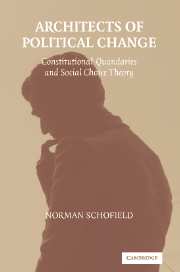Book contents
- Frontmatter
- Contents
- List of Tables and Figures
- Preface
- 1 Constitutional Quandaries and Social Choice
- 2 Power and Social Choice
- 3 Franklin and the War of Independence
- 4 Madison, Jefferson, and Condorcet
- 5 Lincoln and the Civil War
- 6 Johnson and the Critical Realignment of 1964
- 7 Keynes and the Atlantic Constitution
- 8 Preferences and Beliefs
- 9 Political Change
- Bibliography
- Index
- POLITICAL ECONOMY OF INSTITUTIONS AND DECISIONS
1 - Constitutional Quandaries and Social Choice
Published online by Cambridge University Press: 23 November 2009
- Frontmatter
- Contents
- List of Tables and Figures
- Preface
- 1 Constitutional Quandaries and Social Choice
- 2 Power and Social Choice
- 3 Franklin and the War of Independence
- 4 Madison, Jefferson, and Condorcet
- 5 Lincoln and the Civil War
- 6 Johnson and the Critical Realignment of 1964
- 7 Keynes and the Atlantic Constitution
- 8 Preferences and Beliefs
- 9 Political Change
- Bibliography
- Index
- POLITICAL ECONOMY OF INSTITUTIONS AND DECISIONS
Summary
INTRODUCTION
[I]t may be concluded that a pure democracy, by which I mean a society, consisting of a small number of citizens, who assemble and administer the government in person, can admit of no cure for the mischiefs of faction. A common passion or interest will … be felt by a majority of the whole … and there is nothing to check the inducements to sacrifice the weaker party. … Hence it is that such democracies have ever been spectacles of turbulence and contention; have ever been found incompatible with personal security, or the rights of property; and have in general been as short in their lives, as they have been violent in their deaths.
A republic, by which I mean a government in which the scheme of representation takes place, opens a different prospect.
The two great points of difference between a democracy and republic, are first, the delegation of the government, in the latter, to a small number of citizens elected by the rest; secondly, the greater number of citizens and the greater sphere of country, over which the latter may be extended.
It may well happen that the public voice pronounced by the representatives of the people, will be more consonant to the public good, than if pronounced by the people themselves …
If the proportion of fit characters be not less in the large than in the small republic, the former will present a greater option, and consequently a greater probability of a fit choice.
- Type
- Chapter
- Information
- Architects of Political ChangeConstitutional Quandaries and Social Choice Theory, pp. 1 - 22Publisher: Cambridge University PressPrint publication year: 2006

